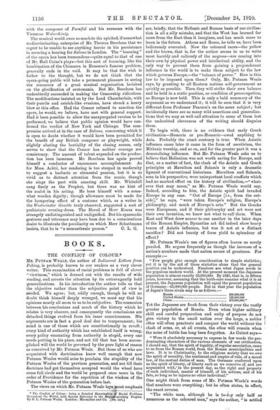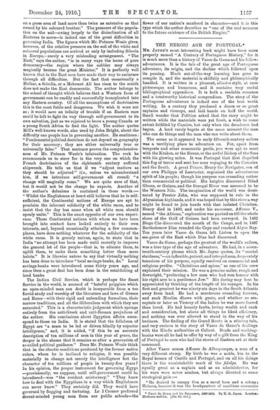BOOKS.
THE CONFLICT OF COLOUR.*
MR. PUTNAM WEALE, the author of Indiscreet Letters from Peking, is probably known to our readers as a very clever writer. This examination of racial problems is full of clever " viewiness," which is dressed out with the results of wide reading, and arrests the attention by its extravagantly bold generalisations. In his introduction the author tells us that the objective rather than the subjective point of view is weeded. We agree ; but, oddly enough, though he will no doubt think himself deeply wronged, we must say that his opinions nearly all seem to us to be subjective. The connexion between his conclusions and much of the history which he relates is very obscure, and consequently the conclusions are detached things evolved from his inner consciousness. His arguments are in fact a good deal due to temperament; his mind is one of those which are constitutionally in revolt ; every kind of authority which has established itself is wrong, every policy emanating from authority is stupid, every one needs putting in his place, and not till that has been accom- plished will the world be governed by the pure light of reason as conceived by Mr. Putnam Weak. But those of us who are acquainted with doctrinaires know well enough that new Putnam Weales would arise to proclaim the stupidity of the Putnam Weales of the previous generation, and not till their doctrines had got themselves accepted would the wheel have come full circle and the world be prepared once more in the order of Providence for the repetition of the wisdom of the Putnam Weales of the generation before last.
The views on which Mr. Putnam Weale lays ost emphasis
• The Conflict of Colour: being a Detailed Examination- Racial Problems throughout the World, with Special Reference to the English-speaking Peoples.
By B. L. Putnam Weale. London: Macmillan and Co. [105. net.] are, briefly, that the Hellenic and Roman basis of our civilisa- tion is all a silly mistake, and that the West has learned far more from the East than it imagines, and has much more to learn in the future. Athens and Rome, he tells us, have been ludicrously overrated. Now the coloured races—the yellow and the brown, that is, for the author seems to us to write most harshly and callously of the negroes—are coming into their own by physical power and intellectual ability, and the only way to prevent them from gaining a preponderant influence in the world is to make them subject to the law which governs Europe,—the "balance of power." How is this law to be imposed upon them? Only, Mr. Putnam Weale says, by granting to all Eastern nations self-government as quickly as possible. Then they will strike their own balance and be held in a static position, or condition of preoccupation, as Europe is now held. This is only a bald summary of the argument as we understand it ; it will be seen that it is very different from Professor Pearson's on the same subject ; but incidentally there are so many wild assertions and generalisa- tions that we may as well call attention to some of them lest the undoubted cleverness of the writing should disguise them.
To begin with, there is no evidence that early Greek civilisation—Homeric or pre-Homeric—owed anything to Asia. Probably the exact contrary is true. When Asiatic influence came later it came in the form of asceticism, the Mithraic worship, and so on, and for the greater part it was a demoralising influence. But Mr. Putnam Weale asks us to believe that Hellenism was not worth saving for Europe, and that, as a matter of fact, the clash of the Asiatic and Greek principles at Marathon and Salamis is only a dramatic figment of conventional historians. Marathon and Salamis, seen in his perspective, were unimportant local conflicts which had no marked effect on the history of civilisation,—" what- ever that may mean," as Mr. Putnam Weale would say. Indeed, according to him, the Asiatic spirit had invaded Europe in any case. "Out of Europe [i.e., from the out- side]," he says, " were taken Europe's religion, Europe's philosophy, and much of Europe's arts." But the Greeks were Europeans, and if their philosophy and art were not their own invention, we know not what to call them. When East and West drew nearer to one another in the later days of the Roman Empire, Byzantine art did indeed show heavy traces of Asiatic influence, but was it not at a distinct sacrifice ? Did not beauty of form yield to splendour of effect ?
Mr. Putnam Weale's use of figures often leaves us sorely puzzled. He argues frequently as though the increase of a nation's numbers made that nation secure of greatness. For example :—
" Few people give enough consideration to simple statistics; yet it is by the aid of these statistics alone that the general position can be understood. Numbers are what Japan needs in the populous modern world. At the present moment the Japanese population is almost exactly 63,000,000. By 1925, that is, in fifteen years, however, assuming that the birth-rate remains what it is at present, the Japanese population will equal the present population of Germany-63,000,000 people. But in that year the population of Japan's three rivals may be as follows :— Russia 200,000,000
United States 120,000,000 China 475,000,000."
Yet the Japanese are fresh from their victory over the vastly greater population of Russia. Even when higher military skill and careful preparation and unity of purpose do not give victory to the small nation over the large, a nobler ethos will often penetrate and conquer the world without the clash of arms, or, at all events, the ethos will remain when the noise of battle has long been forgotten. As Guizot says- " Were it absolutely necessary to express in few words the pre- dominating characters of the various elements of our civilisation, I should say, that the spirit of legality, of regular association, came to us from the Roman world, from the Roman municipalities and laws. It is to Christianity, to the religious society that we owe the spirit of morality, the sentiment and empire of rule, of a moral law, of the.mutual duties of men. The Germans conferred upon us the spirit of liberty, of liberty such as we conceive of, and are acquainted with," in the present day, as the right and property of each individual, master of himself, of his actions, and of his fate, so long as he injures no other individual."
One might think from some of Mr. Putnam Weale's words that numbers were everything; but he often states, in effect, the exact reverse.
"The white man, although he is to-day only half as numerous as the coloured man," says the author, " is settled
on a gross area of laud more than twice as extensive as that owned by his coloured brother." The pressure of the popula- tion on the soil—owing largely to the disinclination of all Easterns to move—is indeed one of the great difficulties in governing India. The figures which Mr. Putnam Weale gives, however, of the relative pressure on the soil of the white and coloured populations are arrived at only by including Siberia in Europe,—surely a very misleading arrangement. " The East," says the author, " is in many ways the home of pure democracy—the region where the cobbler may always magically become the great Minister." It is perfectly well known that in the East men have made their way to eminence through all difficulties. But the fact that occasionally a Holkar, a Scindia, or a Mehemet All has risen to the zenith does not make the East democratic. The author belongs to the school of thought which believes that a Western form of government can be readily and successfully transplanted into any Eastern country. Of all the assumptions of doctrinaires this is the most futile and dangerous. We wish it were not so ; it would save an infinity of trouble if an Eastern race could be left to fight its way through self-government to its own salvation, just as we rejoiced to leave a young Canada or a young South Africa to find the light. The author quotes Mill's well-known words, also used by John Bright, about the difficulty one people has in governing another. He continues : " Fundamental political doctrines do not depend on geography for their accuracy; they are either universally true or universally false." That sentence proves the comprehensive- ness of Mr. Putnam Weale's infatuation. The rock he recommends us to steer for is the very one on which the French doctrinaires of the eighteenth century suffered shipwreck. He tells us that if we " adjust matters as they should be adjusted" (i.e., unless we misunderstand him, if we introduce self-government all round) "a change will magically come." We are quite sure of that, but it would not be the change he expects. Another of the author's delusions is contained in these words :- "Whilst the Englishman at heart still believes that he is self- sufficient, the Continental nations of Europe are apt to proclaim the inherent solidarity of the white races, and to insist that the day has come when all white men should openly unite." This is the exact opposite of our own experi- ence. Those Continental nations with whom we have been brought into contact have looked entirely to their own interests, and, beyond occasionally uttering a few common- places, have done nothing whatever for the solidarity of the white races. It is grossly untrue, again, to state that in India "no attempt has been made until recently to improve the general lot of the people—that is, to educate them, to uplift them, to make them something better than mere helots." It is likewise untrue to say that virtually nothing has been done to introduce " local savings-banks, &c." Local savings-banks were introduced some thirty years ago, and since then a great deal has been done in the establishing of land banks.
The Indian Civil Service, which is perhaps the finest Service in the world, is accused of "hateful priggism which no open-minded man can doubt is inseparable from a too fervid study and worship of the literature and laws of Greece and Rome—with their rigid and unbending formalism, their narrow traditions, and all the illiberalism with which they are saturated." This is a characteristic judgment which springs entirely from the anti-Greek and anti-Roman prejudices of the author. His conclusions about Egyptian affairs corre- spond to those on India. It is stated that the fellaheen of Egypt are "a mass to be led or driven blindly by superior intelligence," and, it is added, " if this be an accurate description of ten millions of men in this year of grace, the deeper is the shame that it remains so after a generation of so-called political guidance." Does Mr. Putnam Weale think that in the chaotic conditions produced by the former native rulers, whom he is inclined to eulogise, it was possible materially to change not merely the intelligence but the character of ten millions of people in twenty-five years P In his opinion, the proper instrument for governing Egypt —provisionally, we suppose, until self-government could be introduced—was " the resident aristocracy." " They knew how to deal with the Egyptians in a way which Englishmen can never know." They certainly did. They would have governed by flogging and torturing. Lo I Cromer preferred decent-minded young men from our public schools—the flower of our nation's manhood in character—and it is this type which the author describes as "one of the real menaces to the future existence of the British Empire."







































 Previous page
Previous page